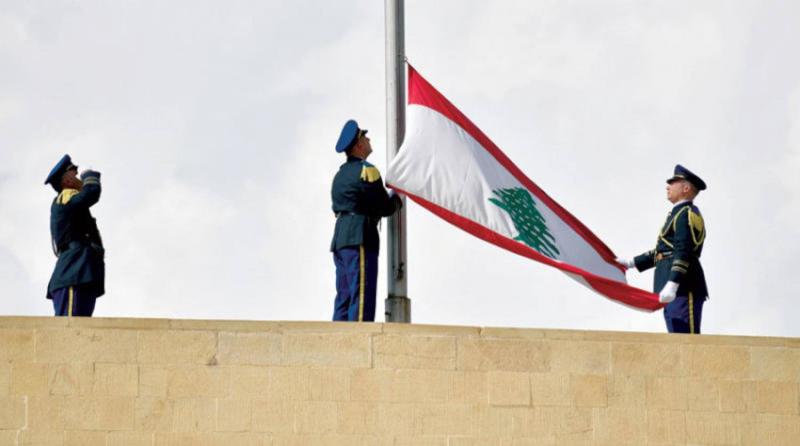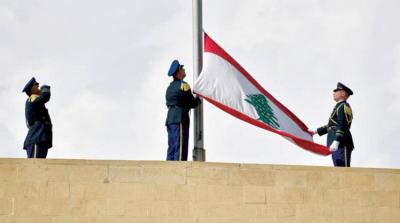The political scene in Lebanon has not improved, even slightly, indicating that the election of a president is currently in a state of political "coma," making it difficult to revive, at least in the foreseeable future, to rescue it from the deadlock. This conclusion was reached by Vatican Secretary of State Cardinal Pietro Parolin and Assistant Secretary-General of the Arab League Hossam Zaki at the conclusion of their meetings with relevant authorities regarding the presidential election. They echo the sentiments of a prominent source within the "Five" committee, asserting that no initiative will achieve its intended goals unless the Lebanese cooperate to rescue the presidential election.
The source warned of a decline in international interest in Lebanon, as several countries focused on their internal affairs diverts attention from aiding Lebanon, raising fears of the presidential election entering a political "coma." He stated to "Asharq Al-Awsat" that ambassadors have not yet decided on their next steps to resume their efforts, although nothing prevents their meetings with political forces. He denied rumors of differences among the committee's ambassador members, confirming that coordination among them is currently optimal and that rumors to the contrary serve to shift blame to the ambassadors, absolving them from the accusation of delaying the presidential election, despite the fact that these rumor-mongers know well that the ambassadors have not interfered with candidates' names since the decision lies with the deputies to facilitate the election of the president, which is within their powers.
The Ball is in the Court of the Parliamentary Groups
The same source noted the difficulty in garnering international and Arab support to pull the presidential election out of its stagnant loop unless the deputies make efforts to meet halfway. Otherwise, the time spent to fill the presidential void will adversely affect the internal situation, which is already burdened by unresolved crises and is further complicated by the escalating situation in southern Lebanon amid rising confrontations between Hezbollah and Israel, warning of a potential expansion of war unless international mediation and American pressure manage to control the situation to prevent it from spiraling out of control, provided a ceasefire in Gaza is immediately reflected in southern Lebanon.
The source reiterated his warning of the costs incurred by Lebanon, with the United States occupied with its presidential elections, similar to France and Britain with their parliamentary elections, and the possibility of a shift in the political scene in Iran depending on the outcome of its second-round presidential elections due to the inability of any candidate to win in the first round. He emphasized that the ball is now in the court of the parliamentary blocs, which must abandon their conditions and enter into a compromise to facilitate the election of a president; otherwise, the "Five" will be futile in its attempts. He added that its ambassadors continuously urge the necessity to halt the obstruction of presidential elections, as Lebanon can no longer afford to have its election on hold while it suffers from total collapse, awaiting the outcome of the situation on the southern front.
Dismantling the Christian Knot
The source reflected on the meetings Cardinal Parolin held in Beirut, mentioning that the information available to the "Five" ambassadors indicates the impossibility of gathering Christian leaders under the Maronite Patriarchy with a Vatican initiative. This prompted the assertion that the failure to gather them will have repercussions, leading to a prolonged presidential vacuum, as their steadfast positions hinder all attempts to facilitate the election. Meanwhile, Speaker Nabih Berri emphasized during his meeting with the Vatican's second-in-command, the importance of dismantling the Christian knot as a foundation for addressing other blocks, considering it a mandatory pathway for paving the way towards ending the presidential vacancy.
The same source confirmed that the meetings held by the Assistant Secretary-General of the Arab League were no better than Parolin's meetings, leading to nearly identical outcomes, although his visit to Lebanon was exploratory and solidary. He reached a conviction that the time has not yet come for electing a president, and that the core issue lies in the disconnect among the parliamentary blocs, which have been unable to reach a consensus on areas that would expedite the reopening of the parliament for the presidential election.
Berri: No Consultation with Those Present
As for the information circulated by leadership sources within "the Free Patriotic Movement" attributing to President Berri that he will call for parliamentary consultation upon securing the participation of 86 deputies, or two-thirds of parliament members, parliamentary sources emphasized to "Asharq Al-Awsat" that what is being promoted is not accurate and needs correction. The Speaker of the Parliament will not issue a call for consultation with whoever is present in the absence of the opposition, adhering to his commitment not to isolate any political component. He does not wish to repeat what happened during the outbreak of the civil war in Lebanon in 1975 when the National Movement decided to isolate the "Kataeb" party, which prompted a Christian backlash that increased sympathy for it.
Parliamentary sources consider what is circulated by "the Free Patriotic Movement" to be framed within the competition between its leader, MP Gebran Bassil, and the leader of the "Lebanese Forces," Samir Geagea, suggesting that Bassil is facilitating the election of the president, unlike his opponent, which ultimately places the responsibility for not responding to end the presidential vacuum on him. The sources further noted that it has become difficult for Bassil during his meetings with the "Moderation" and "Democratic Gathering" blocs to convince them to form a third parliamentary block positioned between the Resistance and the Opposition. They questioned how Bassil could promote his consultation approach when he knows that Berri does not support it and will not call for it with those present, which aligns with a point of agreement with the "Democratic Gathering."




